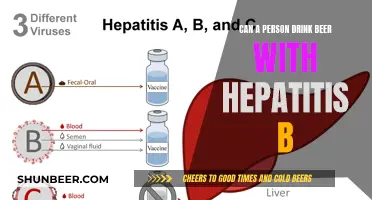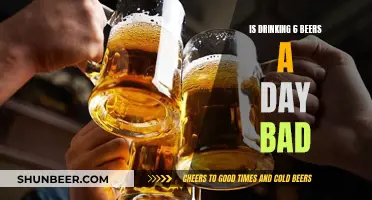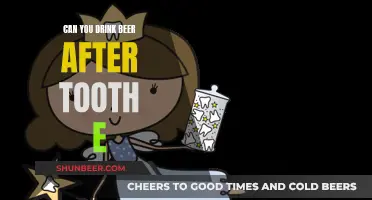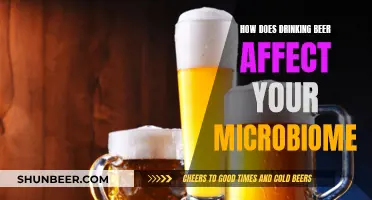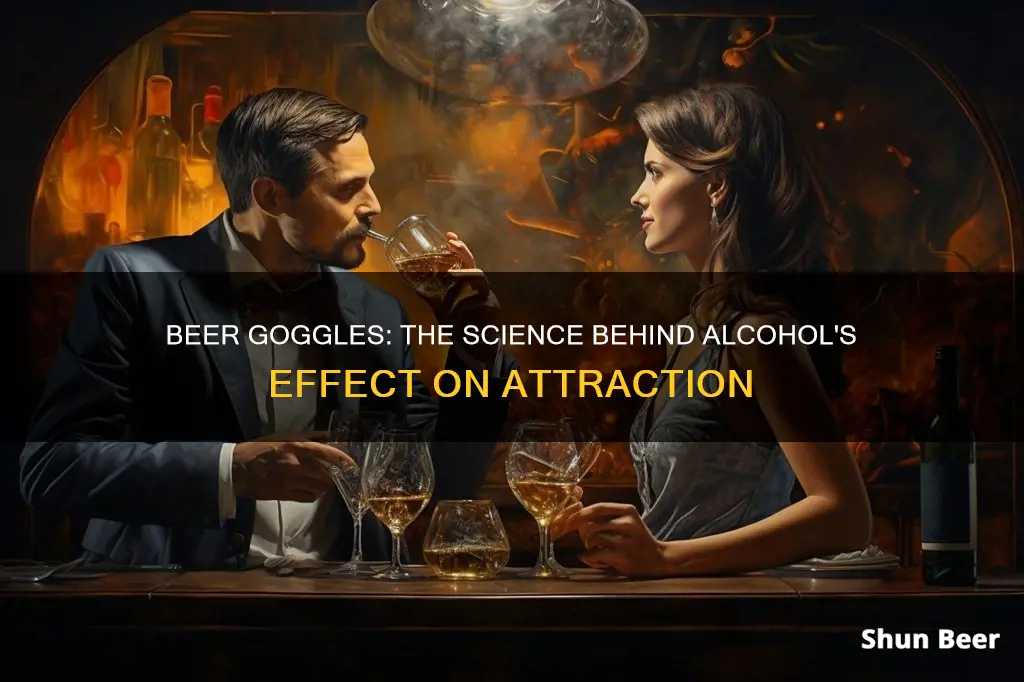
The beer goggle effect is a well-known phenomenon where alcohol consumption can make an unattractive person appear more attractive. While it has been a topic of suspicion for a long time, scientists have now confirmed the existence of beer goggles and are working to understand the mechanisms behind it. One such mechanism is the impairment of facial symmetry perception due to alcohol, which plays a crucial role in attractiveness and human mate selection. Research has shown that both men and women find symmetrical faces more attractive, as symmetry indicates good genes, but alcohol hinders the ability to accurately discern this symmetry.
| Characteristics | Values |
|---|---|
| Alcohol impairs ability to perceive | Facial symmetry |
| Alcohol facilitates | Viewing of sexual images |
| Alcohol improves | Social responses |
| Alcohol has no effect on | Sexual arousal |
| Alcohol increases attraction to | Happy faces |
| Alcohol increases attraction to | Social situations |
| Beer goggles are more pronounced in | Women |
What You'll Learn

Alcohol impairs the ability to perceive facial symmetry
Facial symmetry is a key indicator of attractiveness and plays a significant role in human mate selection. Both men and women seek out outward signs of genetic quality to ensure healthier offspring. Research has shown that ratings of attractiveness are highest when facial symmetry is greatest.
Alcohol, however, impairs the ability to perceive this symmetry. A study conducted by Dr Lewis Halsey and his team at Roehampton University examined the impact of alcohol consumption on facial perception. Over 100 volunteers were randomly assigned to one of three drinking conditions: an alcoholic drink, a similar-tasting non-alcoholic drink, or a diluted soft drink. After consuming their drinks, the volunteers completed tests to determine their ability to distinguish between symmetrical and asymmetrical faces.
The results showed that alcohol drinkers made significant errors in distinguishing between symmetrical and asymmetrical faces, with women drinkers making more errors than men. The effect was found to increase with the amount of alcohol consumed.
This impairment in symmetry perception provides a scientific explanation for the "beer goggles" phenomenon, where people appear more attractive after consuming alcohol. The reduced ability to detect asymmetry may lead individuals to perceive others as more attractive than they would if they were sober, providing insight into why alcohol can make the people around you seem more appealing.
The study raises intriguing questions about the impact of alcohol on partner selection and relationship dynamics. As Dr Halsey noted, "A lot of people say they met their partner when they were drunk. Are their marriages shorter or longer lasting? Does it change the nature of the relationship?"
Beer Diet: Does It Work or Is It a Myth?
You may want to see also

Alcohol reduces inhibitions surrounding sex
Alcohol is a depressant that slows down the body's systems. While feelings of drunkenness are often associated with happiness, they can also lead to anger or depression. Balance, judgment, and coordination are also negatively affected. One of the most significant short-term side effects of alcohol is reduced inhibition, which can lead to an increase in sexual behaviour.
Alcohol impairs the ability to perceive facial symmetry, which is a signal of good genes and plays a key role in human mate selection. Research has shown that ratings of attractiveness in the opposite sex are highest when symmetry is at its greatest. A study conducted by Dr Lewis Halsey of Roehampton University found that alcohol drinkers made significant errors in distinguishing between symmetrical and asymmetrical faces. The effect was more pronounced in women, who made more errors than men.
Alcohol can also have a range of effects on female arousal, desire, responsiveness, and sexual behaviour. Research suggests that drinking alcohol is associated with feeling more attractive and finding others more attractive. Females also reported feeling more desire for sex when they had consumed alcohol. However, consuming too much alcohol can negatively impact the body's response to sexual activity, resulting in less satisfying sex.
For males, the effects of alcohol on sexual behaviour are similar. Alcohol gives them courage and removes inhibitions when it comes to sex. Like females, males also reported less sensation in the genitals after drinking alcohol, which can make it more difficult to reach orgasm. Sexual dysfunction is also more likely in males who are dependent on alcohol.
Energy and Alcohol: Do Beer and Red Bull Work?
You may want to see also

Women are more susceptible to the beer goggle effect than men
The "beer goggle effect" is a well-known phenomenon where alcohol consumption impairs one's ability to accurately assess facial symmetry, which plays a crucial role in determining attractiveness. While this effect is observed in both men and women, research suggests that women are more susceptible to the beer goggle effect than men.
In a study conducted by Dr Lewis Halsey and his team at Roehampton University, male and female volunteers were given alcoholic and non-alcoholic drinks before performing a series of tests, including assessing images of faces that had been manipulated for symmetry. The results showed that alcohol impaired the ability to distinguish between symmetrical and asymmetrical faces, with female drinkers making more errors than their male counterparts. This indicates that women may be more susceptible to the beer goggle effect, finding a wider range of men attractive after consuming alcohol.
The reason for this heightened effect in women is not fully understood but could be attributed to several factors. One possible explanation is the difference in blood alcohol concentration between males and females for the same amount of alcohol intake. Women tend to have a lower body water percentage than men, which means that a given amount of alcohol becomes more concentrated in their bloodstream, potentially leading to a stronger beer goggle effect.
Another factor could be differences in alcohol tolerance. If women in the study had lower alcohol tolerance than men, the same amount of alcohol could have had a more pronounced effect on their perception and decision-making abilities, resulting in a stronger beer goggle effect. Socio-cultural factors may also play a role, with societal expectations and gender norms potentially influencing how women perceive and express their attraction under the influence of alcohol.
The beer goggle effect has important implications for understanding human mate selection and relationship dynamics. It raises questions about the role of alcohol in initial attraction and long-term relationship satisfaction. As Dr Halsey points out, "A lot of people say they met their partner when they were drunk. Are their marriages shorter or longer lasting? Does it change the nature of the relationship?"
While the beer goggle effect may lead to some interesting romantic encounters, it's important to remember that the effect is temporary, and the attraction may not last once the alcohol wears off.
Beer Taxes: Effective or Just a Burden?
You may want to see also

Alcohol enhances sociability
Alcohol has been found to enhance sociability by improving decoding of positive emotions and emotional concern for positive stimuli. It also facilitates the viewing of sexual images, which is consistent with disinhibition, but it does not enhance sexual arousal.
A study by Lewis Halsey of the University of Roehampton and his team invited over 100 volunteers to a laboratory to drink and assess images. The participants were randomly assigned to three drinking conditions: an alcoholic drink, a similar-tasting non-alcoholic drink, or a diluted orange cordial. Twenty to forty minutes after finishing their drink, the volunteers completed tests of concentration and two facial perception tasks. The results showed that alcohol drinkers made significant errors in distinguishing between symmetrical and asymmetrical faces. The study also found that women’s perceptual abilities were more impaired under the influence of alcohol than men's.
Another study found that alcohol increased ratings of stimulation, happiness, talkativeness, openness, and the desire to be with others. The subjective effects of alcohol were greater in participants with higher trait inhibitedness. Alcohol facilitated the recognition of happy faces and enhanced emotional empathy for positive stimuli, particularly in participants with low trait empathy. Pictures of explicit sexual content were rated as less pleasant than neutral pictures after non-alcoholic beer but not after alcoholic beer. Explicit sexual pictures were rated as more pleasant after alcoholic beer, particularly by women.
These effects of alcohol on social cognition likely enhance sociability.
Beer Hair Wash: Does it Work?
You may want to see also

Beer goggles can lead to more positive behaviour
While the "beer goggles" phenomenon is a well-known concept, the idea that alcohol makes people appear more attractive is a myth. However, alcohol can lead to more positive behaviour in several ways. Firstly, it can give people the "liquid courage" to approach attractive individuals, increasing their social confidence and willingness to take risks. This can lead to more positive social interactions and potentially new relationships.
Additionally, alcohol can enhance positive emotions and reduce negative ones, making people feel more relaxed, friendly, and talkative. It can also increase emotional empathy and libido, further promoting positive social behaviour. These effects can be particularly beneficial for individuals with social anxiety or inhibitions, helping them to feel more comfortable in social situations and improving their overall social experience.
The social lubrication provided by alcohol can also foster a sense of camaraderie and connection with others. It can lower inhibitions and create a sense of warmth and friendliness, making people more open to socialising and flirting. This can lead to increased social bonding and the formation of new friendships or romantic connections.
Furthermore, alcohol can enhance people's ability to recognise happy facial expressions, making them more attuned to positive social cues. This can improve their ability to connect with others and respond appropriately to social situations, potentially leading to more positive social outcomes.
While excessive alcohol consumption can have negative consequences, moderate drinking can promote positive behaviour by reducing social anxiety, increasing social confidence, and enhancing emotional empathy and connection. However, it is important to consume alcohol responsibly and be aware of its potential impacts on perception and decision-making.
The Magic of Beer Fob: How It Works
You may want to see also
Frequently asked questions
"Beer goggles" is a term used to describe the phenomenon where people find others more attractive after consuming alcohol.
Alcohol impairs judgement and lowers inhibitions, making people feel less socially awkward and more confident. This can lead to impaired decision-making and increased sexual behaviour.
Yes, a study conducted in 2003 found that participants who had consumed alcohol rated people in photographs as more attractive compared to a sober control group.
Yes, a study in 2012 found that combining alcohol with cigarettes enhanced the "beer goggles" effect, resulting in higher ratings of attraction compared to alcohol alone.
No, the term generally refers to the effects of alcohol, but a 2016 study suggested that the effect may be more psychological. Simply believing that they had consumed alcohol led participants to rate their attractiveness and humour more positively.



